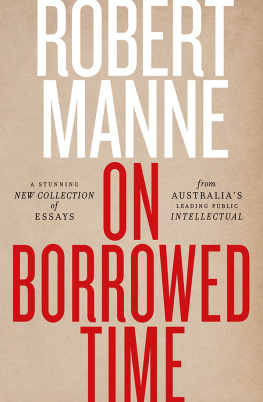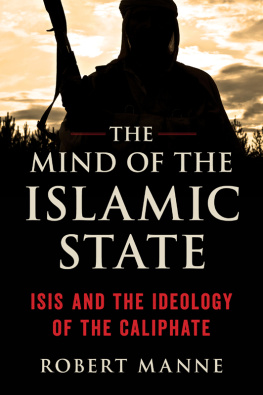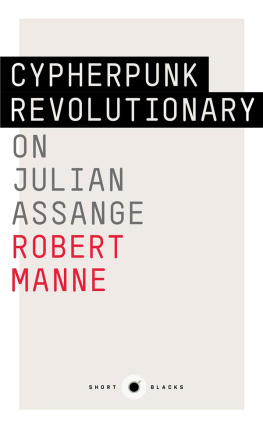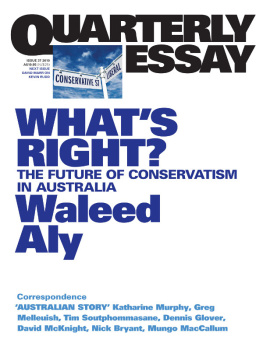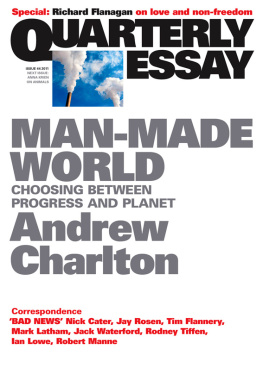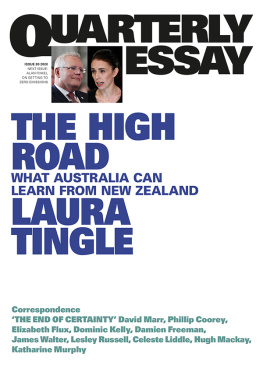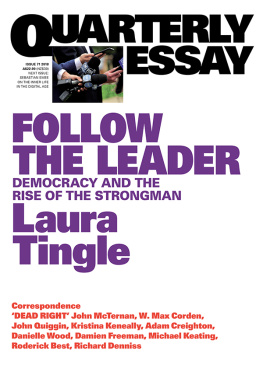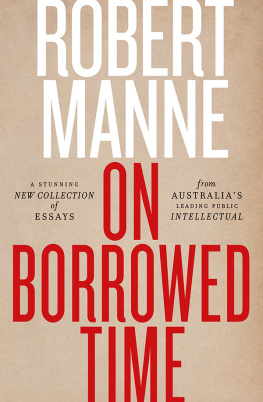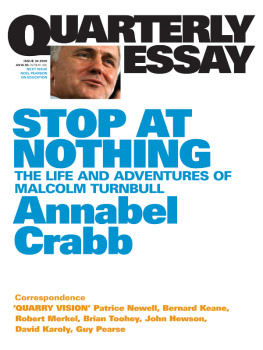Quarterly Essay
Quarterly Essay is published four times a year by Black Inc., an imprint of Schwartz Publishing Pty Ltd
Publisher: Morry Schwartz
ISBN 186 395 1415
Subscriptions (4 issues): $49.95 a year within Australia incl. GST (Institutional subs. $59.95). Outside Australia $79.95. Payment may be made by Mastercard,Visa or Bankcard, or by cheque made out to Schwartz Publishing. Payment includes postage and handling.
To subscribe, fill out and post the subscription form on the last page of this essay, or subscribe online at:
www.quarterlyessay.com
Correspondence and subscriptions should be addressed to the Editor at:
Black Inc.
Level 5, 289 Flinders Lane
Melbourne VIC 3000 Australia
Phone: 61 3 9654 2000
Fax: 61 3 9654 2290
Email: quarterlyessay@blackincbooks.com
http://www.quarterlyessay.com
Editor: Chris Feik
Management: Sophy Williams
Editorial Co-ordinator: Caitlin Yates
Publicity: Meredith Kelly
Design: Guy Mirabella
Printer: Griffin Press
CONTENTS
SENDING THEM HOME
Refugees and the New Politics of Indifference
Robert Manne with David Corlett
Phillip Knightley, Morag Fraser, Larissa Behrendt, Alan Atkinson, James Curran,Sara Wills, Gerard Windsor, Patsy Millett, John Benson, Tim Flannery
In an earlier Quarterly Essay I analysed the campaign of the politicians and their supporters who were determined to repudiate the conclusions and deny the cultural meaning of the Human Rights Commission report into Aboriginal child removal, Bringing them home. More recently many of the same people have lent their support to the task of sending home the recent wave of asylum seekers who fled to Australia from the tyrannies of Iraq, Afghanistan and Iran. This coincidence provided the title for this essay.
There have been a number of excellent books on Australia and the fourth wave of asylum seekers, in particular Peter Mares Borderline, David Marr and Marian Wilkinsons Dark Victory and Frank Brennans Tampering withAsylum. None, however, focus on the impact of politics, policy and law on the asylum seekers themselves. Their experience is at the centre of this essay. Some of the issues in it are approached from a different angle than in earlier work. Some like the Pacific Solution and repatriation have never been dealt with at length before. The purpose of the essay is to allow readers to understand better what these asylum seekers and refugees have already endured and to help convince as many Australian citizens as possible that both the continued detention of asylum seekers and the planned program of repatriation of refugees are wrong. The recent announcement by Mark Latham, that the Australian Labor Party intends to show compassion for refugees, gives reason for hope.
In the deepest sense this essay is a work of collaboration. Between 1999 and 2003, I supervised David Corletts doctoral thesis on asylum seeker policy in Australia. During this time we became friends. More recently we have begun to work together on a research project concerning the repatriation of asylum seekers and refugees. David Corlett carried out much of the primary research on which this essay is based. He has spoken extensively with many asylum seekers still inside the detention centres and with many refugees on temporary protection visas. He has corresponded and conducted phone conversations with asylum seekers and refugees and with their families in places as far afield as Iraq, Afghanistan and Nauru.
I have relied upon David Corletts own writings on asylum seeker policy at many points and on his drafts for different parts of this essay. I have also been influenced by the conversations we have had over the years. Without Davids resourcefulness, enthusiasm and intelligence this essay could never have been written. Nevertheless for its final form and its contents and tone I am solely responsible.
The research for this essay was made possible through a grant from the Myer Foundation. We are grateful to the Foundation and its CEO, Charles Lane. The research was also supported by the Edmund Rice Centre, the Refugee Council of Australia, Amnesty International Australia, the Christian World Service of the National Council of Churches in Australia, Uniya/Jesuit Refugee Service, the Catholic Commission for Justice, Development and Peace, the Asylum Seeker Project of the Hotham Mission and the Victorian Foundation for Survivors of Torture. The essay, however, does not in any way claim to represent their differing views.
Thanks are also due to Elaine and Geoff Smith for their generous support; to Morry Schwartz, Chris Feik and Caitlin Yates; to Father Tony Pearson, Jackie Everitt, Marion Le, Ngareta Rossell, Francis Milne, Keysar Trad, Pearl Longden, David Manne and to the many other people who have forwarded information and facilitated contact with individual asylum seekers and refugees.
Scores of refugees and asylum seekers have trusted David Corlett with their stories. Some are retold in this essay. It is never easy to speak of the terrible experience of dislocation and, as has often been the case, abuse. Both David and I hope that we have done justice to these people.
Robert Manne, March 2004
This essay is part of ongoing work. Anyone who would like to make contact should email d.corlett@latrobe.edu.au.
SENDING
THEM HOME
Refugees and the New Politics
of Indifference
Robert Manne with David Corlett
THE ROAD TO NAURU
At a rough guess the years 191422 generated between four and five million refugees. This first flood of human jetsam was as nothing to that which followed the Second World War, or to the inhumanity with which they were treated.
Eric Hobsbawm, Age of Extremes
Between 1976 and 1981 some two thousand Vietnamese arrived on Australias northern shore. Despite considerable popular hostility and media stories about armadas, criminal gangs and the introduction of exotic disease, the Fraser government accepted all these people as refugees. For the government to have rejected those fleeing from a regime against which Australia had recently fought would have been regarded by many anti-communist Coalition supporters as a great betrayal. As the Prime Minister, Malcolm Fraser, understood, to have rejected them so shortly after the abandonment of the White Australia policy would also have undermined the belief that Australia had truly changed. Fraser was both an anti-communist and an anti-racist.
To its credit the Labor opposition, under both Gough Whitlam and Bill Hayden, acted with political decency. No issue would have been easier to exploit than this. The Vietnamese boat people were accepted as refugees, not on the basis of individual assessments but, on the recommendation of the United Nations High Commission for Refugees (UNHCR), as a collective group. There was at this time in our history no thought of mandatory detention. Indeed, if the Vietnamese had been locked up there would have been a conservative revolt. The refugees were housed in comfortable hostels and provided with generous social welfare and settlement assistance and English-language classes. All were offered permanent residence in Australia. All eventually had the right to apply to have close family join them here.
To stem the arrival of boats, the Fraser government became actively involved in the international diplomacy which aimed to find a solution to the Indochinese refugee exodus. As part of its involvement, the government promised Malaysia and Indonesia that it would take a generous quota of refugees from their holding camps. From the political point of view the planned admission of ten thousand Indochinese refugees each year was far less sensitive than the spontaneous arrival of a considerably smaller number in boats. During the 1980s, 177,000 Vietnamese were invited to Australia as refugees or as part of the countrys official migration program. Due in part to the governments policies, no asylum seeker boat arrived between 1981 and 1987.


